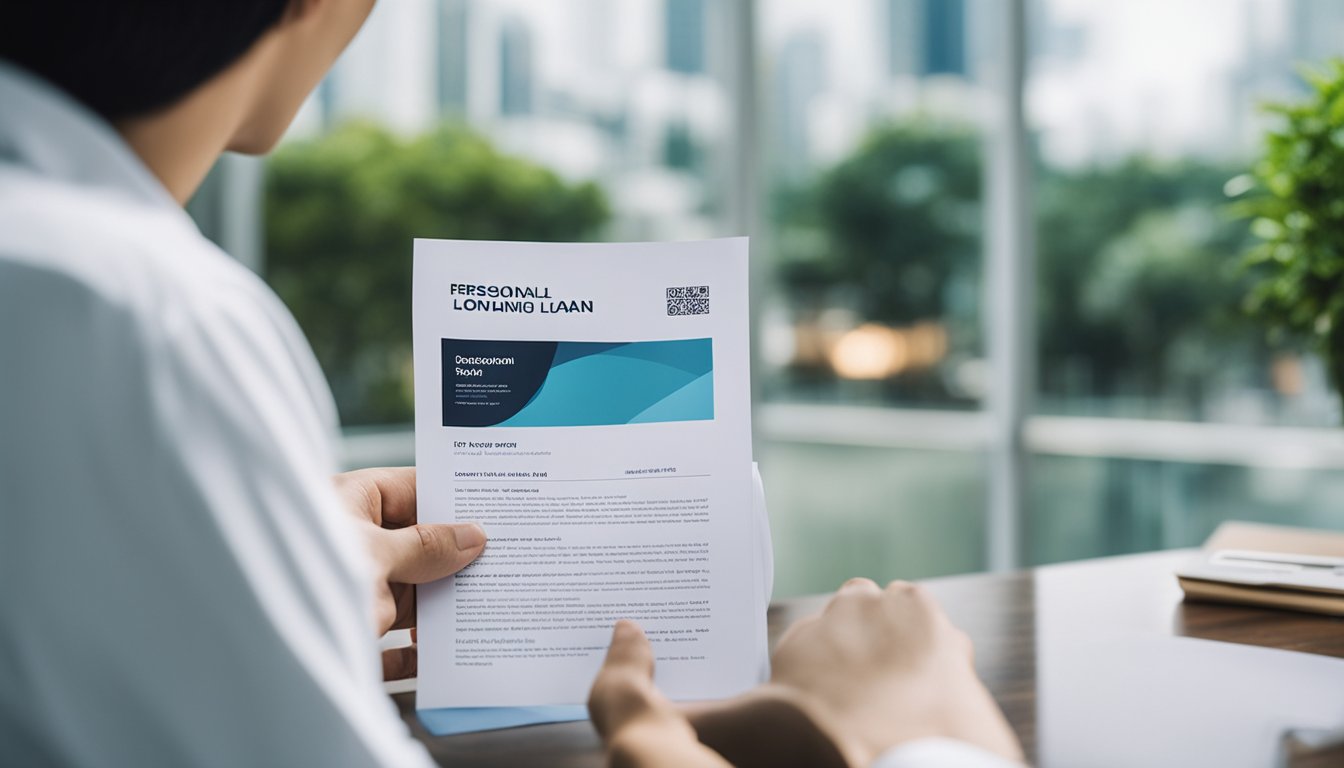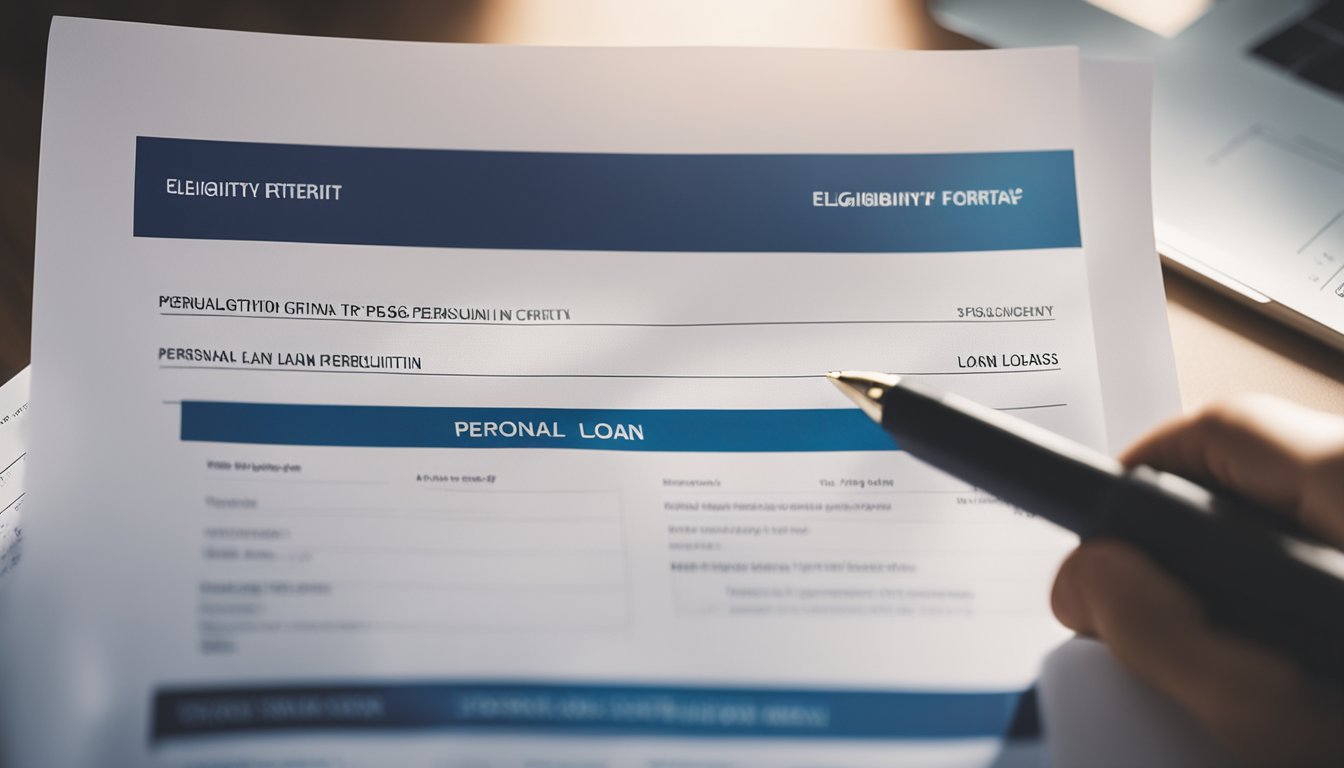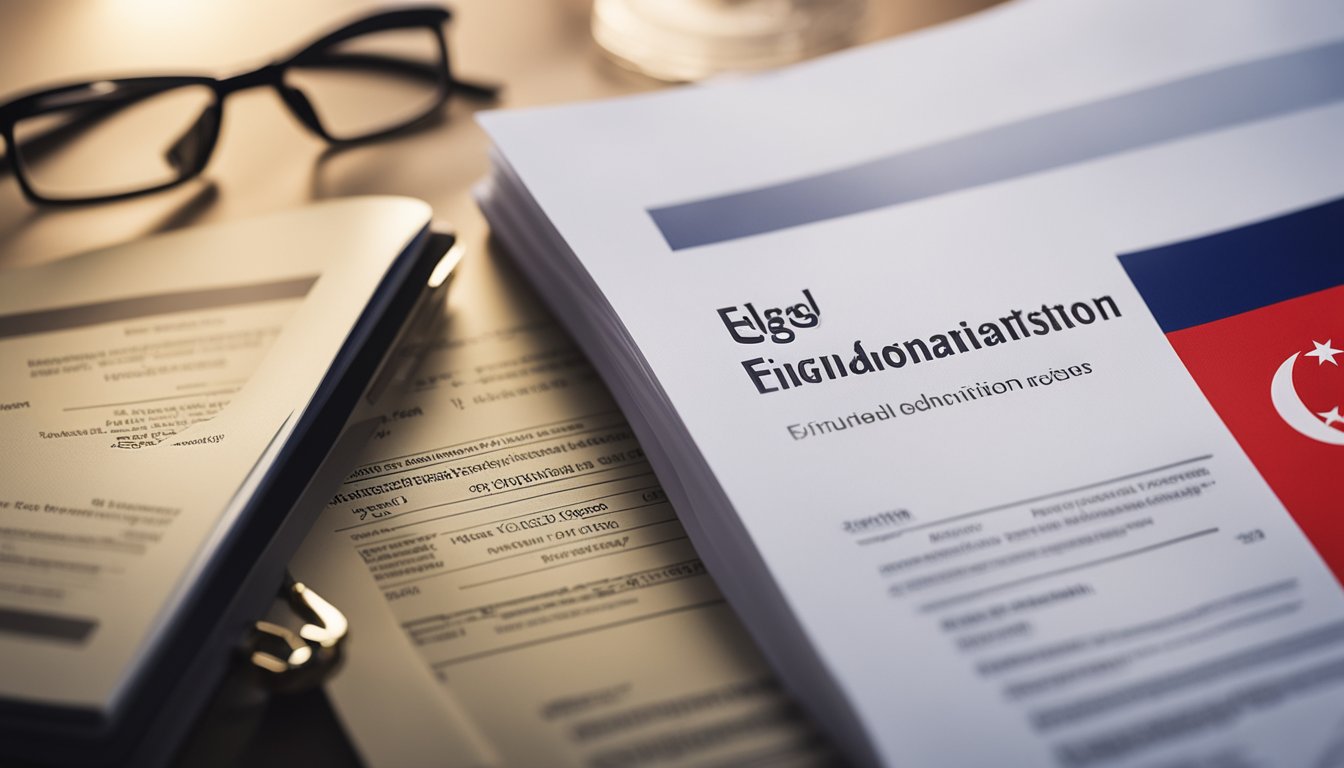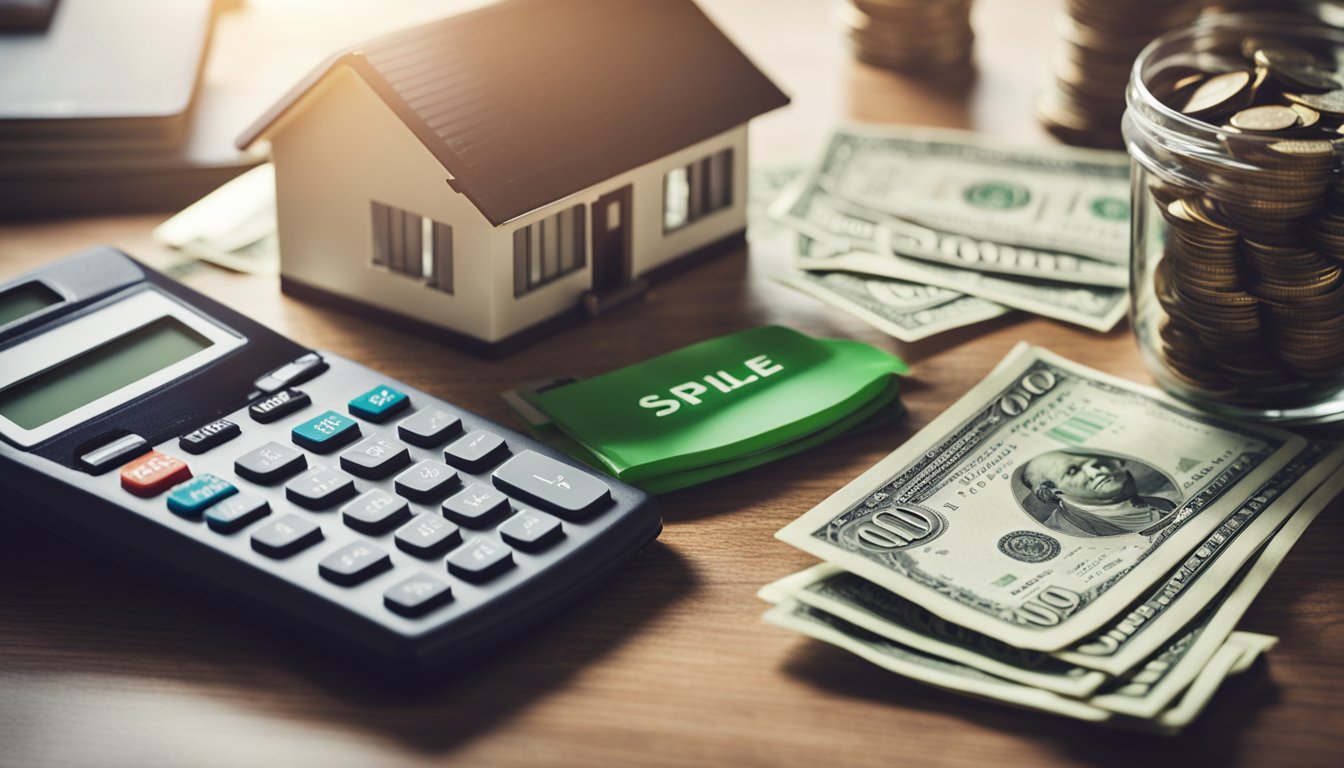Are you wondering if you can take a home loan after a personal loan in Singapore? The answer is yes, it is possible. However, there are certain factors that will affect your eligibility for a home loan after a personal loan.

One of the main factors is your credit score. A good credit score is important for getting approved for a home loan. Your employment status and existing debts will also be taken into consideration. Additionally, the Total Debt Servicing Ratio (TDSR) and Mortgage Servicing Ratio (MSR) will be used to determine how much you can borrow on your home loan.
Overall, taking a personal loan before a home loan may affect your eligibility for a home loan in Singapore. However, with proper financial planning and management, it is possible to take a home loan after a personal loan. Keep reading to find out more about the factors that affect your eligibility for a home loan after a personal loan in Singapore.
3 Min Read: Can I Take a Home Loan After a Personal Loan in SG?
If you don’t have time to read all of this, here’s a section for you:
Are you wondering if you can take a home loan after a personal loan in Singapore? The answer is yes, it is possible. However, there are certain factors that will affect your eligibility for a home loan after a personal loan. Here’s what you need to know in a nutshell:
- Eligibility Factors: Your credit score, employment status, existing debts, Total Debt Servicing Ratio (TDSR), and Mortgage Servicing Ratio (MSR) are crucial factors affecting your eligibility.
- Financial Planning: Balancing multiple loans can be challenging but not impossible. Prioritize repayments, consider debt consolidation strategies, and assess refinancing options.
- Application Process: Understand the required documents and the In-Principle Approval (IPA) process before applying for a home loan.
- Regulatory Framework: Familiarize yourself with the guidelines issued by the Monetary Authority of Singapore (MAS) and understand the differences between licensed moneylenders and banks.
- Interest Rates: Choose between fixed-rate and floating-rate loans, and consider the effective interest rate (EIR) to get a better understanding of the total cost of borrowing.
- Refinancing: Refinancing your home loan may be an option to lower monthly repayments, save on interest, switch loan types, or consolidate debt.
- Property Selling Price and Loan Quantum: Know the Loan-to-Value (LTV) limits based on the property type to determine the loan amount you can get.
Understanding Home Loans in Singapore

If you’re planning to buy a home in Singapore, you may be wondering how to finance your purchase. One option is to take out a home loan. Here’s what you need to know about home loans in Singapore.
Types of Home Loans
There are two main types of home loans in Singapore: fixed-rate and floating-rate. With a fixed-rate loan, the interest rate stays the same for the entire loan period. With a floating-rate loan, the interest rate can fluctuate over time, depending on market conditions.
Interest Rates and Loan Tenure
Interest rates on home loans in Singapore can vary depending on a number of factors, including the type of loan, the loan amount, and the loan tenure. Generally, the longer the loan tenure, the higher the interest rate. It’s important to shop around and compare rates from different lenders to find the best deal.
Mortgage Servicing Ratio (MSR) and Total Debt Servicing Ratio (TDSR)
When applying for a home loan in Singapore, you’ll need to meet certain eligibility criteria, including the Mortgage Servicing Ratio (MSR) and Total Debt Servicing Ratio (TDSR). The MSR is the percentage of your income that can be used to pay your mortgage, while the TDSR is the percentage of your income that can be used to pay all of your debts, including your mortgage.
Loan to Value (LTV) Ratio
The Loan to Value (LTV) Ratio is the percentage of the property value that you can borrow from a lender. In Singapore, the LTV ratio is typically 75% for first-time buyers and 45% for those with existing home loans. If you have two or more outstanding home loans, you can borrow up to 35% of your property’s value.
In summary, when taking out a home loan in Singapore, it’s important to consider the type of loan, interest rates, loan tenure, MSR, TDSR, and LTV ratio. By doing your research and comparing rates from different lenders, you can find the best deal for your needs and budget.
Eligibility Criteria for Home Loans

If you are considering taking a home loan after a personal loan in SG, there are certain eligibility criteria that you need to meet. Here are some of the key factors that lenders consider:
Credit Score and Financial History
Your credit score is a crucial factor that lenders consider when evaluating your home loan application. A good credit score indicates that you have a history of timely repayments and responsible credit behaviour. This, in turn, increases your chances of getting approved for a home loan.
In addition to your credit score, lenders will also look at your financial history, including your debt-to-income ratio, outstanding debts, and any previous bankruptcies or defaults. It’s important to have a clean financial history to improve your chances of getting approved for a home loan.
Income and Employment Status
Your income and employment status are also important factors that lenders consider when evaluating your home loan application. Lenders will typically look at your gross monthly income to determine your repayment capacity.
If you have a stable employment status with a regular income, it will increase your chances of getting approved for a home loan. On the other hand, if you are self-employed or have an irregular income, it may be more challenging to get approved for a home loan.
Existing Personal Loan Impact
If you have an existing personal loan, it can impact your eligibility for a home loan. Lenders will take into account your existing debt obligations when evaluating your repayment capacity.
If you have a high debt-to-income ratio, it may be more challenging to get approved for a home loan. However, if you have a good credit score and a clean financial history, it may offset the impact of your existing personal loan.
Overall, meeting the eligibility criteria for a home loan after a personal loan in SG requires a combination of good credit score, clean financial history, stable employment status, and a manageable debt-to-income ratio. By meeting these criteria, you can increase your chances of getting approved for a home loan and achieve your dream of owning a home.
Managing Multiple Loans in Singapore

If you have taken a personal loan and are now considering taking a home loan, managing repayments for both loans can be challenging. However, with careful planning and the right strategies, you can balance your loan repayments and improve your cash flow.
Balancing Home and Personal Loan Repayments
When you have multiple loans, it’s important to prioritize your repayments. Your home loan should take priority over your personal loan since it is a secured loan and has a lower interest rate. Make sure you pay your home loan instalments on time to avoid late payment charges and additional interest.
For your personal loan, consider paying more than the minimum amount due each month to reduce the total interest payable. Alternatively, you can also consider refinancing your personal loan to a lower interest rate to reduce your monthly repayments.
Debt Consolidation Strategies
If you have multiple loans and are struggling to manage repayments, debt consolidation can be a useful strategy. Debt consolidation involves combining all your loans into a single loan with a lower interest rate and a longer repayment period.
You can consolidate your loans by taking out a debt consolidation loan or by using a balance transfer credit card. With a debt consolidation loan, you can enjoy a lower interest rate and a fixed repayment period, making it easier to manage your loan repayments. With a balance transfer credit card, you can transfer the outstanding balance of your high-interest loans to a credit card with a lower interest rate.
In conclusion, managing multiple loans in Singapore can be challenging but not impossible. By prioritizing your loan repayments and using debt consolidation strategies, you can balance your loan repayments and improve your cash flow.
Application Process for Home Loans

If you are planning to take a home loan after a personal loan in Singapore, you need to understand the application process for home loans. Here’s a quick guide to help you get started.
Required Documents
To apply for a home loan, you will need to provide the following documents:
- NRIC or passport
- Income documents (e.g. payslips, tax assessment, CPF statement)
- Property documents (e.g. Option to Purchase, Sale & Purchase Agreement)
You may also be required to provide additional documents depending on your employment status, type of property, and loan amount.
It is important to ensure that all documents are accurate and up-to-date to avoid any delays or complications during the application process.
In-Principle Approval (IPA)
Once you have submitted your application and all required documents, the lender will conduct a credit assessment and evaluate your eligibility for a home loan.
If you meet the lender’s criteria, you will receive an In-Principle Approval (IPA) letter. This letter will indicate the loan amount you are eligible for and the terms and conditions of the loan.
It is important to note that an IPA is not a guarantee of a loan. The lender may still reject your application if there are any discrepancies or issues with your documents or credit assessment.
In conclusion, taking a home loan after a personal loan in Singapore is possible, but you need to be aware of the application process and requirements. Make sure you have all the necessary documents and meet the lender’s eligibility criteria to increase your chances of approval.
Did you know owning your dream home is within reach, even after a personal loan?
Unlock the key to financial freedom: planning your down payment and monthly instalments wisely before diving into home loans. Calculate your down payment – remember, CPF Ordinary Account savings can help! Then, assess loan packages like fixed vs. floating rates and HDB vs. bank options. With smart planning, you’ll find the perfect home loan to build your future, one brick at a time!
Remember, responsible financial planning is the foundation for a happy and secure future. So, start planning today and make your dream home a reality!
Financial Planning for Future Homeowners

If you are considering taking out a home loan after a personal loan in Singapore, it is important to plan your finances carefully. Here are some tips to help you navigate the financial planning process:
Calculating Down Payment and Instalments
Before you start looking for a home loan, it is important to calculate how much you will need for a down payment. This is typically a percentage of the purchase price of the property and can range from 5% to 20%. You can use your CPF Ordinary Account savings to pay for the down payment, subject to certain limits.
Once you have calculated your down payment, you should also consider how much you can afford to pay each month in instalments. This will depend on your income, expenses, and other financial commitments. You can use an online mortgage calculator to estimate your monthly instalments based on different loan amounts and interest rates.
Assessing Loan Packages and Options
When choosing a home loan, it is important to assess different loan packages and options to find the one that best suits your needs and budget. Some factors to consider include the interest rate, loan tenure, and repayment options.
You can choose between fixed-rate and floating-rate home loans. Fixed-rate loans offer a stable interest rate for a fixed period of time, while floating-rate loans have an interest rate that fluctuates with market conditions.
You should also consider whether to take out a HDB loan or a bank loan. HDB loans are offered by the Housing Development Board and have lower interest rates but stricter eligibility criteria. Bank loans are offered by commercial banks and have higher interest rates but more flexible eligibility criteria.
Overall, taking out a home loan after a personal loan in Singapore requires careful financial planning and consideration of different loan options and packages. By calculating your down payment and instalments and assessing different loan options, you can find the best home loan for your needs and budget.
Additional Loans and Their Impact

If you have taken a personal loan and are planning to take a home loan, you may be wondering how other loans can affect your eligibility. It’s important to keep in mind that any additional loans you have will impact your Total Debt Servicing Ratio (TDSR) and Mortgage Servicing Ratio (MSR), which are key factors in determining your eligibility for a home loan.
Renovation and Education Loans
If you have taken a renovation or education loan, you should be aware that these loans will also impact your TDSR and MSR. Renovation loans are considered part of your home loan, while education loans are considered part of your personal loan. This means that if you have taken a renovation or education loan, your TDSR and MSR will be higher, which could affect your eligibility for a home loan.
Car Loans and Their Influence on Home Loan Eligibility
Car loans are also considered part of your personal loan, and will impact your TDSR and MSR. If you have taken a car loan, you should be aware that this will increase your monthly debt obligations, which could impact your eligibility for a home loan.
When it comes to taking a home loan after a personal loan, it’s important to keep in mind that any additional loans you have will impact your eligibility. While renovation and education loans are considered part of your home loan and personal loan respectively, car loans are considered part of your personal loan. This means that any additional loans you have will increase your monthly debt obligations, which could affect your eligibility for a home loan.
It’s important to carefully consider your financial situation and consult with a financial advisor before taking on any additional loans, especially if you are planning to take a home loan in the near future. By doing so, you can ensure that you are making the right financial decisions for your situation, and that you are able to meet your financial obligations without putting your home ownership goals at risk.
Regulatory Framework in Singapore

If you’re considering taking a home loan after a personal loan in Singapore, it’s important to understand the regulatory framework that governs the lending industry. Here are some key things to keep in mind:
Monetary Authority of Singapore (MAS) Guidelines
The Monetary Authority of Singapore (MAS) is the central bank of Singapore and is responsible for regulating the financial industry. MAS has issued guidelines that govern the lending practices of banks and financial institutions in Singapore.
Under the guidelines, banks and financial institutions are required to assess a borrower’s ability to service their loan before granting them a loan. This assessment takes into account the borrower’s income, expenses, and other financial obligations. The guidelines also set out the maximum loan-to-value (LTV) ratio that a borrower can borrow based on the value of the property.
Licensed Moneylenders vs Banks
In addition to banks and financial institutions, there are also licensed moneylenders in Singapore. Licensed moneylenders are regulated by the Ministry of Law and are required to comply with strict rules and regulations.
If you’re considering taking a home loan after a personal loan, it’s important to understand the differences between licensed moneylenders and banks. While licensed moneylenders may offer more flexible terms and conditions, they typically charge higher interest rates than banks.
Banks, on the other hand, may offer lower interest rates and longer repayment periods, but they also have more stringent eligibility criteria. To qualify for a home loan from a bank, you typically need to have a good credit score, a stable income, and a low debt-to-income ratio.
In conclusion, if you’re considering taking a home loan after a personal loan in Singapore, it’s important to understand the regulatory framework that governs the lending industry. By familiarising yourself with the guidelines issued by MAS and the differences between licensed moneylenders and banks, you can make an informed decision about your borrowing options.
Understanding Interest Rates

If you’re considering taking out a home loan after a personal loan in Singapore, one of the key factors to consider is the interest rate. The interest rate is the cost of borrowing money from the lender, and it can have a significant impact on the total cost of your loan. Here are some things you should know about interest rates in Singapore.
Fixed vs Floating Rate Loans
When you take out a home loan in Singapore, you can choose between a fixed rate or floating rate loan. A fixed rate loan has a set interest rate that remains the same throughout the loan term, while a floating rate loan has an interest rate that fluctuates based on market conditions.
One advantage of a fixed rate loan is that you’ll know exactly how much your monthly repayments will be, which can help you budget more effectively. However, if interest rates drop, you won’t be able to take advantage of the lower rates without refinancing your loan.
On the other hand, a floating rate loan can be more flexible, as your interest rate will adjust automatically based on market conditions. This means that if interest rates drop, your monthly repayments will decrease as well. However, if interest rates rise, your repayments will increase, which can make it more difficult to budget.
Effective Interest Rate
When comparing home loan offers, it’s important to look beyond the advertised interest rate and consider the effective interest rate (EIR). The EIR takes into account all the fees and charges associated with the loan, such as processing fees, legal fees, and valuation fees, and expresses them as an annualised percentage rate.
The EIR is a more accurate reflection of the true cost of borrowing, and can help you compare different loan offers more effectively. Keep in mind that a loan with a lower advertised interest rate may not necessarily be the cheapest option once you factor in all the fees and charges.
In summary, when taking out a home loan after a personal loan in Singapore, it’s important to consider the interest rate carefully. Fixed rate loans offer more certainty and stability, while floating rate loans can be more flexible. Make sure to compare the EIR rather than just the advertised interest rate to get a better sense of the total cost of borrowing.
Refinancing Options

If you have taken a personal loan and are considering taking a home loan, refinancing may be an option for you. Refinancing is the process of replacing your existing home loan with a new one, usually with a lower interest rate or a longer loan tenure.
When to Consider Refinancing
Refinancing may be a good option for you if:
- You want to lower your monthly repayments: Refinancing can help you lower your monthly repayments by reducing your interest rate or extending your loan tenure. This can help you free up some cash for other expenses or investments.
- You want to save money on interest: Refinancing can help you save money on interest over the long term by getting a lower interest rate. This can help you pay off your loan faster and save money on interest charges.
- You want to switch to a different type of loan: Refinancing can help you switch from a variable rate loan to a fixed rate loan or vice versa. This can help you manage your repayments better and reduce your risk of interest rate fluctuations.
- You want to consolidate your debt: Refinancing can help you consolidate your debt by combining your personal loan and home loan into one loan. This can help you simplify your finances and reduce your interest charges.
Before you decide to refinance your home loan, it is important to consider the costs involved, such as legal fees and valuation fees. You should also compare the interest rates and loan terms offered by different lenders to find the best deal for you.
In conclusion, refinancing can be a good option if you want to lower your monthly repayments, save money on interest, switch to a different type of loan, or consolidate your debt. However, it is important to consider the costs involved and compare the different options available to find the best deal for you.
Property Selling Price and Loan Quantum

If you are planning to take a home loan after a personal loan in Singapore, you need to know how much loan quantum you can get based on the property selling price. The loan quantum is the maximum amount that the bank can lend you based on the value of the property you want to purchase.
Determining Loan Amount Based on Property Value
In Singapore, banks can only provide up to 75% Loan-to-Value (LTV) of any borrower’s property price valuation. This means that if you plan to purchase a property sold at S$100,000, they can only loan you up to S$75,000.
Here’s a table that shows the Loan-to-Value (LTV) limits for different types of properties in Singapore:
| Property Type | LTV Limit |
|---|---|
| HDB | 90% |
| Private | 75% |
As you can see, if you are planning to purchase an HDB flat, you can get up to 90% LTV, which means you can borrow up to 90% of the property’s value. On the other hand, if you are planning to purchase a private property, you can only get up to 75% LTV.
Once you know the LTV limit for your property, you can calculate the loan amount you can get based on the selling price. For example, if you are planning to purchase an HDB flat sold at S$500,000, you can get up to S$450,000 (90% of S$500,000) as a loan. Similarly, if you are planning to purchase a private property sold at S$1,000,000, you can get up to S$750,000 (75% of S$1,000,000) as a loan.
In conclusion, knowing the LTV limit for your property is important in determining the loan quantum you can get based on the selling price. This information can help you plan your finances and budget your expenses accordingly.
Frequently Asked Questions
How thrilling is it to know if I’m eligible for a home loan despite having an existing personal loan?
It’s always thrilling to know that you may be eligible for a home loan despite having an existing personal loan. However, it’s important to keep in mind that eligibility depends on a variety of factors, including your income, credit score, and existing debt. You can use loan eligibility calculators to get a rough idea of your eligibility.
What are the chances of immediate approval for a home loan after taking a personal loan?
The chances of immediate approval for a home loan after taking a personal loan depend on various factors such as your credit score, income, existing debt, and the lender’s policies. While some lenders may approve your application immediately, others may take longer. It’s best to check with the lender before applying for a home loan.
Is it possible to juggle repayments if I take out a home loan on top of a personal loan?
Yes, it is possible to juggle repayments if you take out a home loan on top of a personal loan. However, it can be challenging to manage two loans at the same time. You can consider consolidating your loans or refinancing your personal loan into a home loan to make repayments more manageable.
Can my personal loan be seamlessly converted into a home loan? What’s the process?
It’s not possible to seamlessly convert a personal loan into a home loan. Personal loans are unsecured loans, while home loans are secured loans. The process of converting a personal loan into a home loan involves refinancing the personal loan into a home loan, which may involve additional fees and charges.
Are there any exhilarating options for taking a second loan from another bank for a home after getting a personal loan?
Yes, there are options for taking a second loan from another bank for a home after getting a personal loan. However, it’s important to keep in mind that taking on additional debt can affect your credit score and debt-to-income ratio. You can consider consolidating your loans or refinancing your personal loan into a home loan to make repayments more manageable.
What’s the most electrifying way to calculate my eligibility for a home loan after a personal loan?
The most electrifying way to calculate your eligibility for a home loan after a personal loan is to use loan eligibility calculators provided by banks and financial institutions. These calculators take into account your income, credit score, and existing debt to give you an idea of your eligibility. It’s important to keep in mind that these calculators provide only a rough estimate, and actual eligibility may vary depending on various factors.
EASE YOUR FINANCIAL WORRIES WITH QUICK CREDIT PTE LTD
In the bustling city of Singapore, the demand for Personal Loans has skyrocketed. It’s no secret that the cost of living is rising rapidly, leaving many struggling to cover everyday expenses. Whether it’s dreaming of a well-deserved getaway or keeping up with the latest tech trends, everyone has their reasons for seeking financial assistance.
Fortunately, there’s a simple solution at hand: a personal loan from Quick Credit Pte Ltd. As a licensed moneylender in Jurong, we understand the diverse needs of our customers.
To apply for a personal loan, all you need are the essentials:
- NRIC / Work Pass
- Latest 3 months payslip
- CPF Contribution Statements
- Proof of Address
Don’t let financial constraints hold you back any longer. Take the first step towards financial freedom with Quick Credit Pte Ltd today. Apply now and experience the ease of securing the funds you need.
